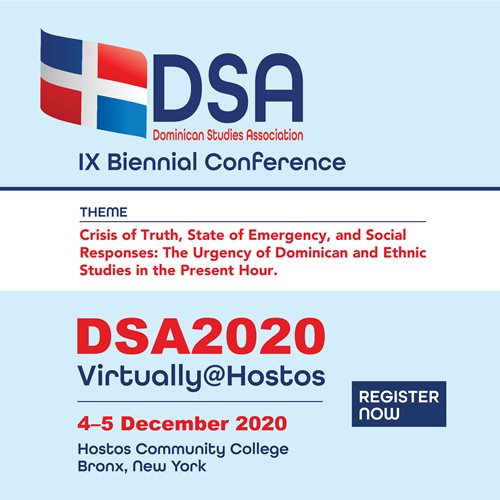DSA2020VIRTUALLY@HOSTOS BIENNIAL CONFERENCE
REGISTRATION IS NOW OPEN

“Crisis of Truth, State of Emergency, and Social Responses:
The Urgency of Dominican and Ethnic Studies
in the Present Hour”
13 Countries | 92 Universities | 28 Non-Academic Institutions
#DSA2020 #DSA2020Virtually
(New York) Monday, November 16, 2020 - The Dominican Studies Association and Eugenio María de Hostos Community College opened
registration for the
9th Biennial DSA2020Virtually@Hostos conference on December 4 and 5 called, "Crisis of Truth, State of Emergency, and Social Responses: The Urgency of Dominican and Ethnic Studies in the Present Hour."
The
DSA2020Virtually@Hostos call-for-proposals drew scholars, industry, and thought leaders representing 13 countries, 92 universities, and 28 non-academic institutions. The two-day event is scheduled with over 41 panels spread out across XVII sessions, including session XIII, the only plenary, a timely discussion featuring top higher education leaders in the United States and the Dominican Republic on the challenge of their institutions, vis-a-vis the current health crisis and beyond.
“Numerous influential Dominican leaders from New York and elsewhere are expected at the conference,” said Interim President of Hostos Daisy Cocco De Filippis, “cultural and educational figures from Argentina, Brazil, Canada, Colombia, Chile, Cuba, England, Germany, Norway, the United States, and Spain have said
presente and that tells me that people want to connect and learn from one another to contribute to society.”
DSA2020 Virtually@Hostos is co-chaired by Professor Silvio Torres-Saillant, Ph.D., of Syracuse University and Hostos Associate Dean of Community Relations Ana I. García Reyes.
"Dominicans have produced a collective body of knowledge, covering all disciplines, amplified throughout the world. DSA2020 Virtually@Hostos secured the participation of artists, academics, award-winning authors, renowned intellectuals, and other experts in the field of Dominican studies. The DSA board of directors, Professor Torres-Saillant and I look forward to you joining us for this historical virtual gathering,” said Dean García Reyes.
DSA2020 Virtually@Hostos schedule includes National Book Award winner, poet Elizabeth Acevedo; world-renowned author Julia Álvarez; U.S. Congressman (NY-13th District) Adriano Espaillat; poet, playwright, and essayist Scherezada “Chiqui” Vicioso; CUNY Board of Trustee Mayra Linares; and EVP of the Fund for the City of New York, Aldrin Bonilla.
Also presenting at DSA2020 Virtually@Hostos, eight New York court judges, they are: Justice Llinét M. Rosado, New York State Supreme Court Justice, Bronx County; Rolando T. Acosta, Presiding Justice, New York State Supreme Court’s Appellate Division; Manuel J. Méndez, Associate Justice, New York State Supreme Court’s Appellate Division; Rita Mella, Judge, Manhattan Surrogate Court; Lourdes Ventura, Justice, New York State Supreme Court, 11th Judicial District; Bianka Pérez, Judge, New York City’s Civil Court in Bronx County; Fidel Gómez, Judge, New York City’s Civil Court in Bronx County; and Angela J. Bádamo, Judge, New York City’s Criminal Court, New York County.
To register please visit:
https://hostos-cuny-edu.zoom.us/webinar/register/WN_wJHseIuHR6yfFIuUYUA88A
To learn more about the conference please visit:
http://dominicanstudiesassociation.org
For more information please email:
dominicanstudiesassociation@gmail.com
This year, the DSA waves the conference fees for both participants and panelists and asks instead to consider a $30 donation to help offset the technological costs of the DSA2020 Virtually@Hostos Biennial Conference.
An official link for donations will be shared closer to the conference dates.
About the Dominican Studies Association
The Dominican Studies Association supports the diffusion of intellectual production by providing Dominican Studies scholars the opportunity to create supportive networks, cultivate alternative agendas beyond their respective institutions and address polemic issues impacting the homeland, local, and global Dominican diasporic communities.